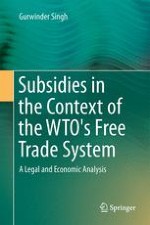
2017 | Supplement | Chapter
1. Regulating Free Trade from the WTO Perspective
Author : Gurwinder Singh
Published in: Subsidies in the Context of the WTO's Free Trade System
Publisher: Springer International Publishing
Activate our intelligent search to find suitable subject content or patents.
Select sections of text to find matching patents with Artificial Intelligence. powered by
Select sections of text to find additional relevant content using AI-assisted search. powered by